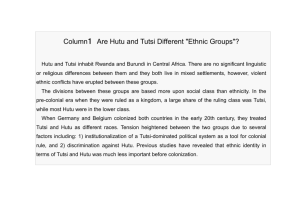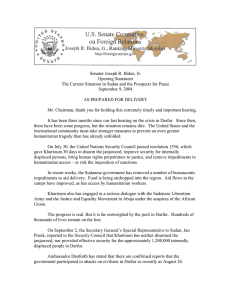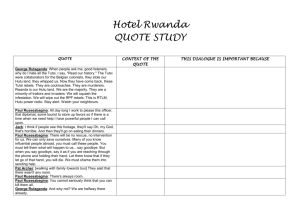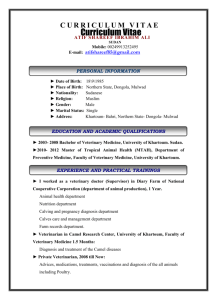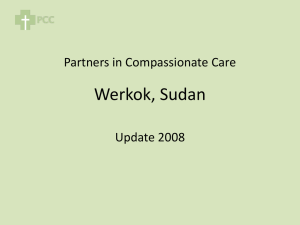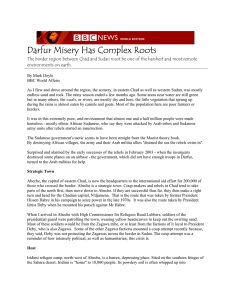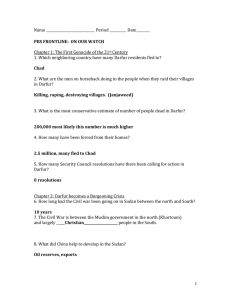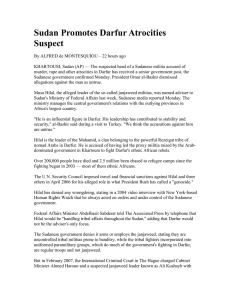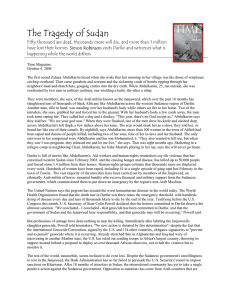17.523: Ethnicity and Race in World Politics-Fall 2005 Prof. M. Nobles
advertisement
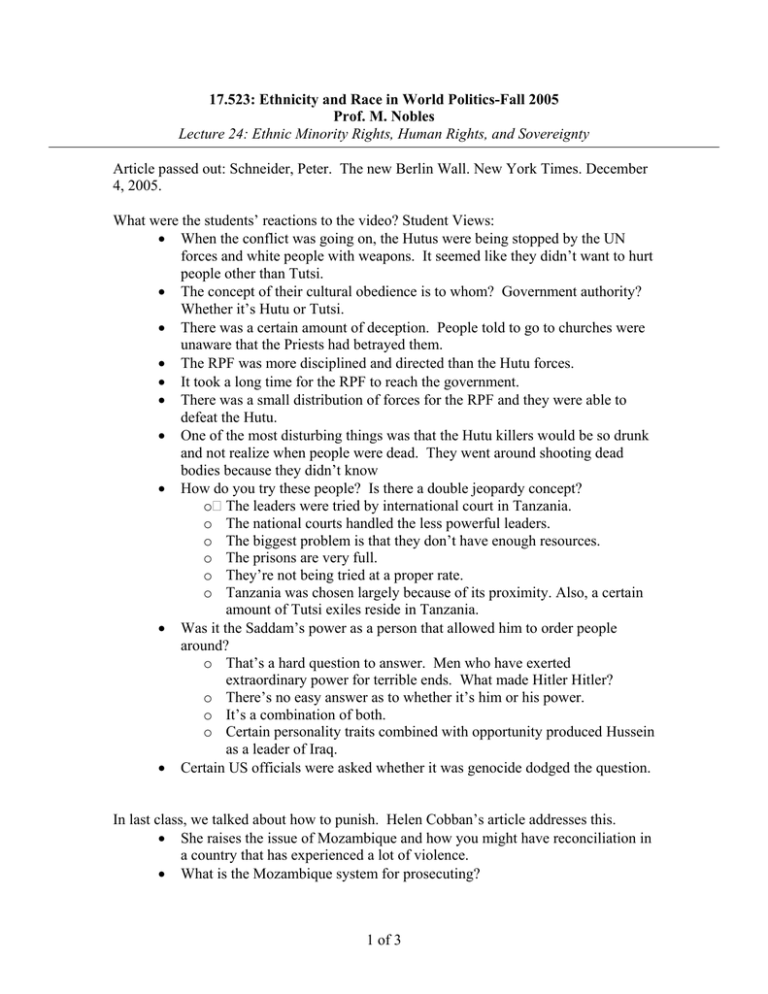
17.523: Ethnicity and Race in World Politics-Fall 2005 Prof. M. Nobles Lecture 24: Ethnic Minority Rights, Human Rights, and Sovereignty Article passed out: Schneider, Peter. The new Berlin Wall. New York Times. December 4, 2005. What were the students’ reactions to the video? Student Views: • When the conflict was going on, the Hutus were being stopped by the UN forces and white people with weapons. It seemed like they didn’t want to hurt people other than Tutsi. • The concept of their cultural obedience is to whom? Government authority? Whether it’s Hutu or Tutsi. • There was a certain amount of deception. People told to go to churches were unaware that the Priests had betrayed them. • The RPF was more disciplined and directed than the Hutu forces. • It took a long time for the RPF to reach the government. • There was a small distribution of forces for the RPF and they were able to defeat the Hutu. • One of the most disturbing things was that the Hutu killers would be so drunk and not realize when people were dead. They went around shooting dead bodies because they didn’t know • How do you try these people? Is there a double jeopardy concept? o The leaders were tried by international court in Tanzania. o The national courts handled the less powerful leaders. o The biggest problem is that they don’t have enough resources. o The prisons are very full. o They’re not being tried at a proper rate. o Tanzania was chosen largely because of its proximity. Also, a certain amount of Tutsi exiles reside in Tanzania. • Was it the Saddam’s power as a person that allowed him to order people around? o That’s a hard question to answer. Men who have exerted extraordinary power for terrible ends. What made Hitler Hitler? o There’s no easy answer as to whether it’s him or his power. o It’s a combination of both. o Certain personality traits combined with opportunity produced Hussein as a leader of Iraq. • Certain US officials were asked whether it was genocide dodged the question. In last class, we talked about how to punish. Helen Cobban’s article addresses this. • She raises the issue of Mozambique and how you might have reconciliation in a country that has experienced a lot of violence. • What is the Mozambique system for prosecuting? 1 of 3 o People are brought back into the community because the evil that was in their community was just that. Mozambicans claimed that evil that committed those acts, not the people. o They’re not saying that atrocities didn’t happen, but offenders had to offer an account of what they had done. • When did the conflict in Mozambique end? o Early 1990s • Mozambique tried to integrate the offenders back into society. Made them do community service if they claimed that evil possessed them. Genocide today? Darfur, Sudan • • • • • • Received independence in 1956 from Britain. There is a north-south divide. Capitol, Khartoum is in the north. War was waged in 1955-1972, between North and South. It picked back up in 1975. Why were the evangelicals in Midland Texas interested in the Sudan? o There were Christians in the Sudan who were being persecuted. • They pushed the Bush administration into resolving the conflict. • Bush responds to their pressure by appointing former Senator Danforth who led the American efforts to bring peace to the southern Sudanese crisis. • Southern Sudanese liberation army’s head is John Garang. • He agrees to be vice president in Khartoum. • He is then killed in an airplane accident • The peace agreement still appears to be holding up, even after his death. • The years of fighting have been disastrous for the south. As the Samantha Powers article paints it, as do a number of observers, there seems to have been a delicate balance between Arab nomadic herders and African Farmers. As long as the balance was in shape, they weren’t at war. • What was that balance and what threw it off? o Both groups were expanding and needed more land. o Land became scarce partly because of drought. • How do the Arabs survive? o They’re herdsmen. • The central government in Khartoum ignored the signs of the brewing tension. • In the late 1990s, there were hundreds of fights. • The government saw what was going on, but didn’t know what to do and didn’t do enough. • Sudanese liberation army sensed the brewing problems and the fact that the government wouldn’t do anything. • All top jobs were going to the Arabs from the North. • As a result, the Darfur liberation army was formed. • Wanted to get the world’s attention. • Arab militias use rape as a war tool. 2 of 3 • The fighting has sent over 100,000 people into exile and killed at least 75,000 people. What does each side want? • Darfur liberation army wants a better redistribution of government funds and • Also wants government to stop assisting Arabs in the war. • Why hasn’t the government responded with force against militias. o There are competing explanations: Idea of straight racism. Central government refuses to respond to another group’s demands. • If they respond, the government will have to respond to any other group. Public funds are not well distributed among regions or ethnic groups. 3 of 3
